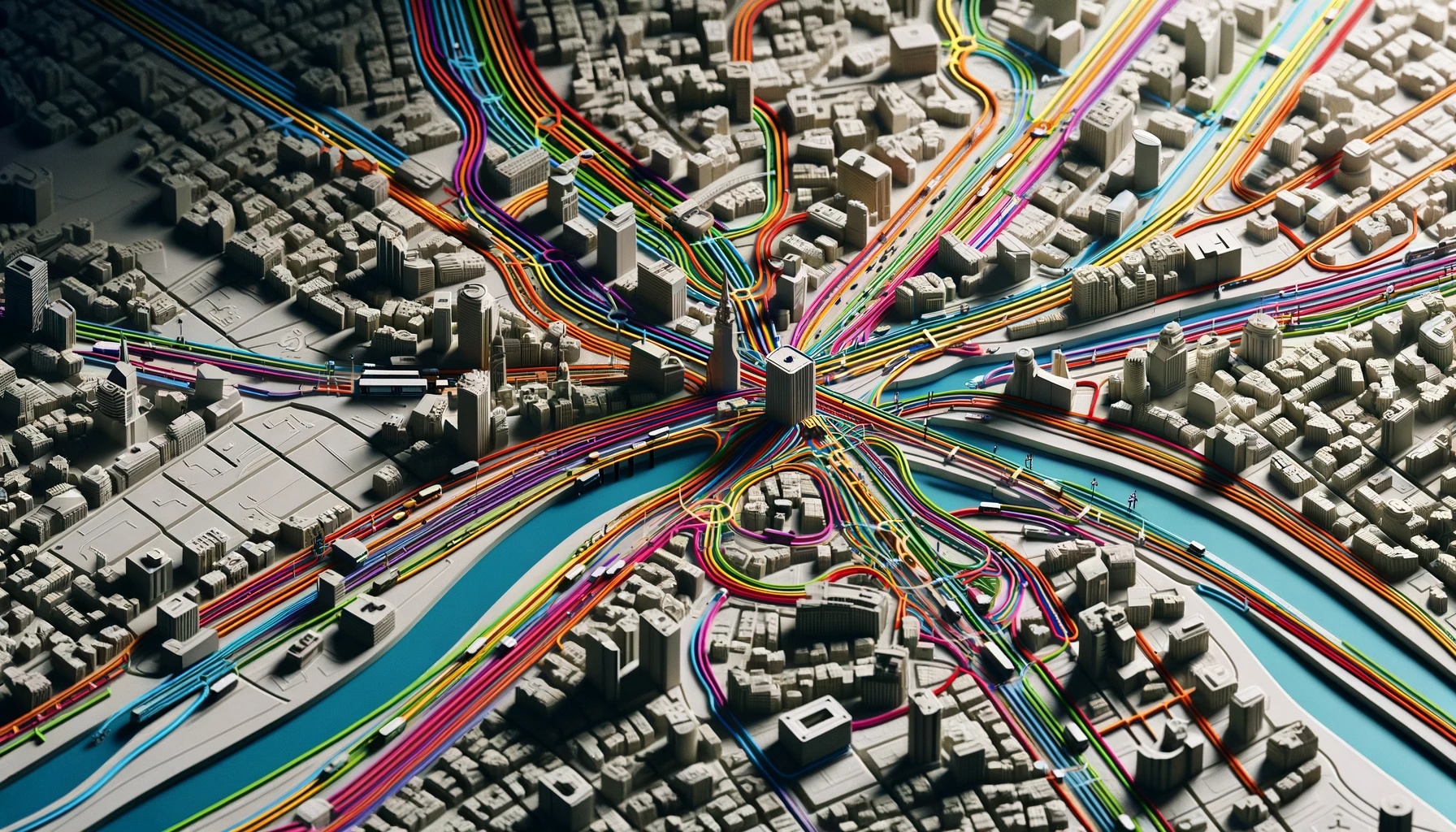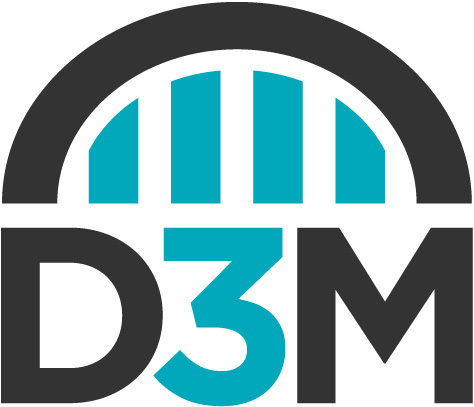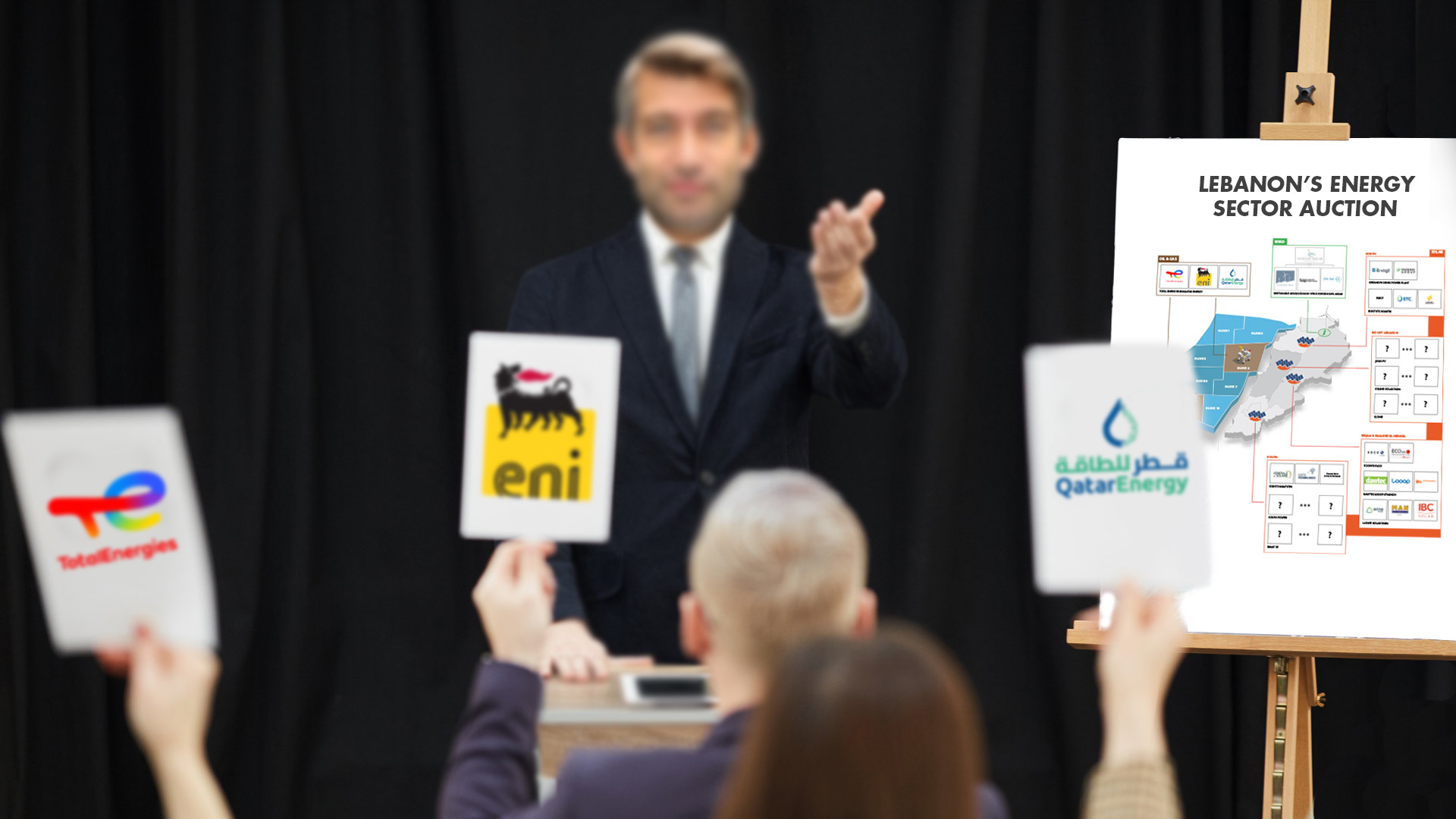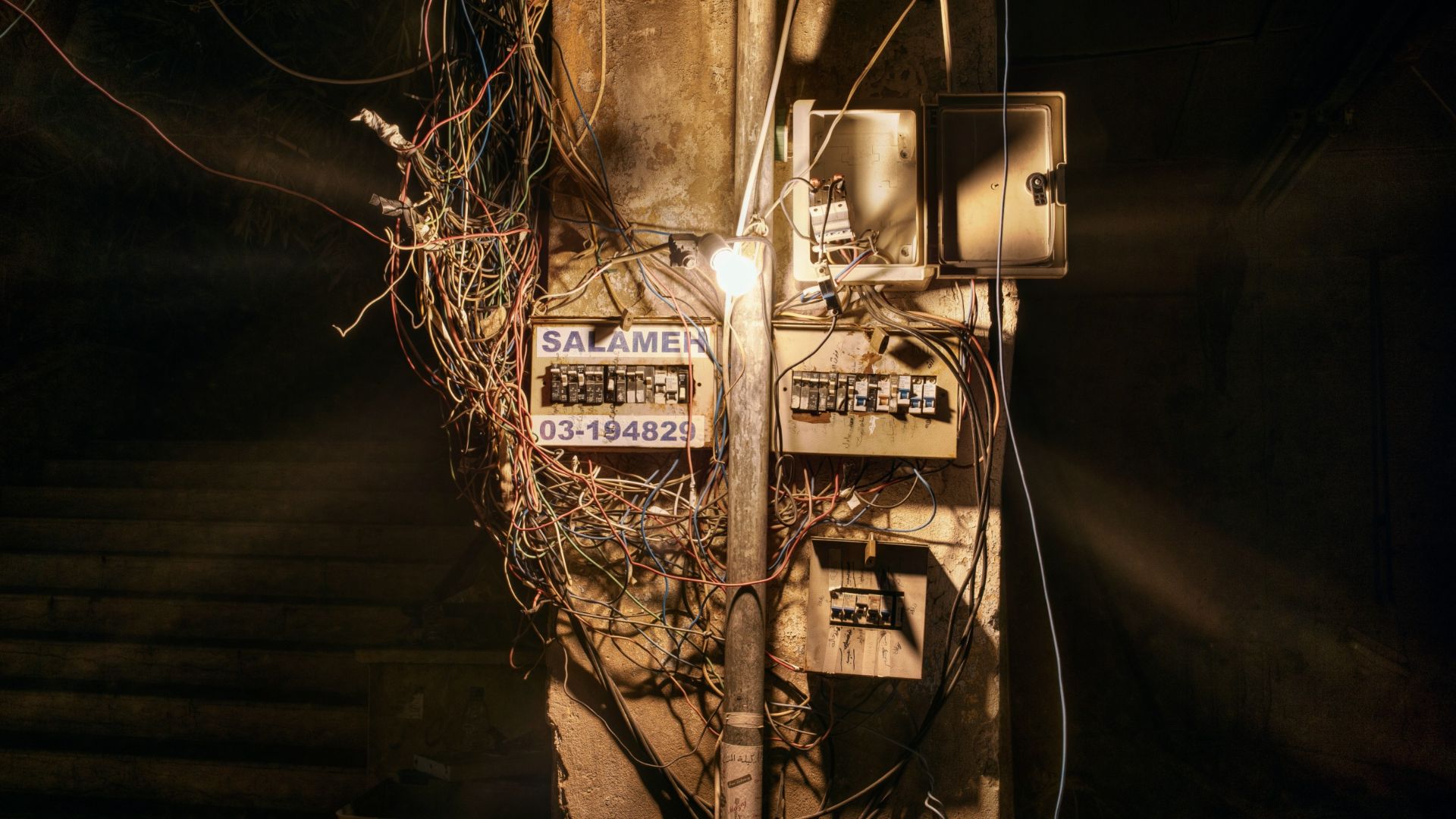Introduction
In the 1950s and 1960s, Lebanon boasted one of the West Asia and North Africa region’s most effective public transport systems, comprising intercity rail, trams, and buses. Then came the Lebanese civil war (1975-1990), which left much of the country in ruin and divided Beirut into east and west. After the war, Lebanon’s once exemplary public transport network crumbled, while the country became totally dependent on private cars. Today, public transport means catching taxis or private vans, which operate free from serious state regulation. Transport around Lebanon still favours the wealthy, the healthy, and the able-bodied over more vulnerable community members, who can only dream of socially inclusive transport options.
The public transportation system that Lebanon needs and deserves should act as a meeting point for citizens; it should be a public space where people come together, regardless of political or sectarian divisions, and celebrate the diversity of the Lebanese population. If realised, this public transport system would contribute to building a stronger societal fabric across the country’s various regions, sects, genders, and political affiliations.
This position paper explains the two main obstacles facing public transport reforms: political co-optation / lack of political will and weak state regulation. Since the civil war, various political groups and parties have assumed control over key taxi and shared van services. This political backing allowed taxi and bus operators to entrench their businesses and vehemently oppose more sustainable forms of transport, such as large public buses and train networks. Meanwhile, the state failed to implement essential regulations aimed at improving Lebanon’s public transport network. Taxi operators flouted formal industry regulations (known as the red license plate system), while public authorities generally failed to punish selfish commuter behaviour, such as parking cars on pedestrian sidewalks.
In the immediate future, smart public transport reforms must be realistic amid Lebanon’s ongoing political and economic crises. It would be virtually impossible to build a comprehensive state-run transport network without a stable government in place and extensive capital investment. For this reason, progressive actors and opposition groups should first advocate for making the current informal system safer and more accessible, while also championing non-motorised forms of transport. Over time, as Lebanon gradually recovers, policymakers can harness the necessary political and financial capital to build a lasting, sustainable public transport network for all.
Roadblocks to Transport Reform
In the past 30 years, Lebanon has become a nation chronically addicted to private cars. According to the “MENA Transport Report 2019,”1 Lebanon had a total of 1.2 million registered private cars in 2015. The national overreliance on cars causes congestion in the Greater Beirut area as well as daily delays at the entrances of the city in the North, South, and East; alarmingly, these major corridors experience an average speed of just 10-30 km/hr. Meanwhile, public transport within Beirut accounts for no more than 20 percent of all trips. Most of these trips take place via shared taxi, or service, with only 2 percent being catered to by buses and vans. In addition, Lebanon suffers from a dearth of appropriate walking and cycling infrastructure in Beirut (and elsewhere), even though Beirut enjoys “good conditions for non-motorised transport,” given the city’s high density and compact area.2 Faced with blocked or dilapidated sidewalks, pedestrians must often walk on roads alongside cars – a key contributing factor to pedestrians making up 29 percent of traffic accident casualties.3 Cyclists and scooter riders can almost never find designated lanes, exposing them to heightened danger too, and only Byblos municipality operates one, small-scale bicycle-sharing service.4
Tragically, Lebanon has left untouched several useful plans for improving public and non-motorised transport. One of the government’s first post-war projects was the Greater Beirut Area Transportation Plan (GBATP).5 As an immediate response, the GBATP recommended introducing a public bus system of 400 buses and three fully equipped bus depots, which would service 80 million rides per year. The GBATP also contemplated organising the taxi-service by setting up fixed routes equipped with passenger-boarding at lighting facilities at various stations. Unfortunately, most of the GBATP’s proposals remain nothing but ink on paper. Since then, various pilot projects – such as an IAU-IDF-led design for improving soft mobility on Damascus Road6 – have been left unimplemented. Instead, policymakers have consistently invested in expanding Lebanon’s road and highway network, leaving public transport for the informal private sector to control.
While many Lebanese lament the woeful state of the nation’s public transport, reform initiatives must directly confront the two root causes of the current malaise:
a. Political Co-Optation / Lack of Political Will
Following the civil war, Lebanese political elites created entrenched, vested interests within the transport sector’s peak representative bodies. During the early 1990s, the political elites successfully undermined the independence of the country’s transport unions and syndicates. They achieved this outcome by creating separate syndicates and planting party loyalists inside already existing unions. At present, Lebanon’s transport sector has anywhere between 23 and 27 different syndicates, alongside six unions. It is not easy to access detailed information about the composition of syndicates and unions; Chadi Faraj, co-founder of mobility justice CSO Riders’ Rights, nevertheless provides a general overview. At Beirut’s Cola intersection, two syndicates operate with close ties to the Amal Movement: the Syndicate of Public Transport Vehicle Operators (headed by Ali Mohieddine, with over 40,000 members) and the Union of Land Transport (headed by Bassam Tlais). Across town at the Dora intersection, Beirut’s other key transport junction, the Lebanese Forces and the Free Patriotic Movement hold sway. Dora hosts the General Syndicate of Public Transport Drivers in Lebanon and the General Union of Drivers and Transport Workers Syndicates in Lebanon (both headed by Marwan Fayyad).
Political parties have also attached themselves to key transport routes run by the private sector. The current system of informal transport is deeply rooted in, and connected to, the Lebanese political and clientelist network. Commonly, drivers defend their self-declared exclusive “rights” to operate on a certain line or, at least, insist that newcomers pay fees to participate. This system is well illustrated by the business model for Beirut’s well-known number 4 van, which carries around 56,250 passengers each day from Hay al-Salloum, in south Beirut, to Hamra. Each driver on the line must stop and pay a fee in one of three designated parking lots in Beirut’s southern suburbs.7 Similar partisan and sectarian arrangements exist across key transport routes throughout the country.
With political backing, Lebanon’s ramshackle transport system has successfully obstructed attempts at long-term, sustainable reform. To date, the most striking example has been the ill-fated history of Lebanon’s public bus network. Historically, the public transport authority (OCFTC) had a very small fleet of old and badly maintained buses. Only 25 buses had survived the war and they were carrying a total of less than 20,000 passengers a day. This decrease in the quality of services lead to private owners-operators running their own makeshift services, with no timetable nor fixed routes. Private operators responded violently when the Lebanese government attempted to rejuvenate Beirut’s public bus system in 1997, intimidating public bus drivers and causing the project’s discontinuation. Political co-optation and corruption help to explain the non-implementation of other modes of public transport, like rebuilding train networks. For example, buildings have gradually encroached on the corridor of land assigned for a coastal train line, by now rendering the concession virtually non-existent. The illegal occupation of the rail corridor, made possible by corruption and antipathy to rival forms of public transport, hinders any potential reinstating of the coastal rail line.
b. Weak State Regulation
For decades, the Lebanese government has undermined the transport sector’s effectiveness by failing to key industry regulations. Privately owned vans regularly flout traffic safety laws, operate vehicles that would fail roadworthiness tests, and use high-volume polluting engines. Owing to their private sector focus, informal operators have succeeded in responding positively to market demand in some respects. Private sector routes, such as the number 4 van, offer passengers an alternative to using private cars. Many customers view the service as cheap and of acceptable quality, while thousands of drivers benefit from relatively stable employment. The informal system fails spectacularly, however, in terms of catering to people with disabilities. Mobility of these groups is severely restricted as barrier-free access is almost non-existent. At the same time, sidewalks are commonly filled with obstructions and the public transport vehicles are not equipped to carry people with wheelchairs and other mobility aids.
The scheme for regulating public transport – the red license plate system – has fallen into disarray. Under the system, private operators can purchase a license to operate public transport services that is issued by the Traffic and Vehicle Management Authority (TVMA) (which falls under the Ministry of Interior’s jurisdiction) in the form of a red license plate. In other countries, this type of license or concession to operate public transport services is usually specific to a certain region, type of service, and timeframe. In Lebanon, however, red plate owners have the right to provide services anywhere on Lebanese territory at whichever time they please. This has led to an over-supply of shared-taxi vehicles and vans on some major profitable routes, while less popular lines receive virtually no coverage. The red plate license system also causes regulatory chaos by allowing plates to be treated as tradeable assets. Red license plates can be bought and sold on the market, or even handed down from father to son. These lax rules greatly complicate the task of regulating the industry. A UNDP study estimated that there are 17,000 illegally procured and operated taxis in circulation. Yet at present, political leaders and members of parliament are announcing plans to issue an additional 20,000 red license plates – viewed by critics as a cynical attempt to extend patronage networks even further into the transport sector.8
Recommendations
At present, Lebanon has neither a stable government nor access to extensive financial resources: key requirements for large-scale public transport reform. Even approved public transport projects are currently under threat, like the 2018 World Bank-approved loan to build the Greater Beirut Public Transport Project, a rapid bus transit system for the Greater Beirut area.9 The donor has foreshadowed withdrawing its financial commitment as the project has stalled and politicians discuss diverting the funds for other purposes, such as creating social subsidy cards for low-income households. Accordingly, immediate reform priorities should revolve around better organising the current transport system and providing more alternative, non-motorised transit options.
Short-term Recommendations:
Lobbying for the state-led organisation of the informal sector, based on a carrot / stick approach. As noted, previous government attempts at reforming the informal transport sector have failed due to political interference and / or a lack of political will. The economic crisis, however, presents a great opportunity for policymakers to bring informal transport operators to the negotiating table. Progressive actors and opposition groups could lobby the government to offer subsidised fuel to transport operators, but only if they comply with key regulations. These preconditions for support could include the following:
- Only vehicles with authentic license plates will be eligible and all vehicles must be fitted with Radio Frequency ID systems to avoid forgeries
- Coupons for subsidised fuel prices are specific to the relevant vehicle and cannot be transferred
- All vehicles must undergo and pass yearly vehicle safety inspections
- All vehicles must be equipped with GPS tracking, which will allow authorities to monitor their location and movements
- Drivers must abide by all road safety rules applicable in their areas of operation
In this way, policymakers can convince parties with vested interests (e.g. syndicates, unions) that complying with new regulations would lead to better economic outcomes and overall service delivery.
Connect and form lobbying power with relevant NGOs. There are several organisations and groups that have been advocating for better mobility in Lebanon, including Riders’ Rights, The Chain Effect, and Train-Train. These groups have been active in promoting not only for organised public transport, but also for making the current informal system more accessible to people and pushing for better cycling infrastructure as well. They have built strong relationships with syndicates, government employees, and industry experts. Opposition groups would benefit from reaching out to these organisations as they have a deep knowledge base that can be built upon. Support and more exposure through media and event organisation will help in advocacy for public transport. Until now, the transport-focused NGOs have not addressed the question of accessibility and safety of public transport, especially for women, the LGBTQI+ community and other vulnerable groups. Moreover, the NGOs have not advocated for anti-harassment security measures on public transport. Progressive actors and opposition groups could support such actions by raising awareness among both passengers and drivers that public transport should be a service that welcomes everyone. Awareness-raising activities could include ad campaigns that encourage inclusivity on public transport, which have been used successfully in other countries. For example, Berlin’s public transport operator has cleverly promoted greater tolerance on public transport by using humour and sarcasm to bring forward certain points.10
Lobby municipalities to exercise their full legislative powers in relation to the transport sector. Municipalities stand out as strong potential partners in public transport reform. Under the Municipal Law, municipalities have the power to implement projects targeting a wide range of transport-related issues.11 These include planning roads, creating parks, and building public squares. Municipalities also enjoy the specific legislative power to issue tenders for local public transportation services. With this authority, municipalities can (and should) take initiative in keeping sidewalks clear from obstructions, creating bicycle lanes, designating spaces for parking non-motorised vehicles, and so on.
Support policies aimed at boosting non-motorised transport. As noted above, Lebanese commuters face a deplorable range of alternatives to motorised transport. Without delay, policymakers should clear obstacles away from sidewalks, ensuring that they offer barrier-free access for wheelchairs, prams, and other non-motorised vehicles. In addition to walking, opposition groups can advocate for policies aimed at encouraging soft mobility options like bicycles and other non-motorised transport options. Where possible, the state should create designated bicycle lanes to ensure that people can cycle safely, especially for short-distance trips. Encouragingly, international experience has shown that commuters will start cycling as long as there is a cycling infrastructure available, and people feel safe.
Instituting car-free days is one promising mechanism for boosting non-motorised transport. This policy, which could apply once per month to begin with, allows people to reclaim public spaces and use non-motorised transport safely. It should be noted, however, that enforcement of car-free days could prove especially difficult during the current economic crisis, as many Lebanese rely on motorised transport to sustain their livelihoods.
Long-term Recommendations:
If Lebanon can appoint a stable government, lobby for more fundamental, long-term solutions to the transport sector. Opposition groups can begin by lobbying for the implementation of the World Bank-backed Greater Beirut Public Transport Project, which would add much needed resources and efficiency to the city’s transit network. Future studies must carefully explore long-term options for furnishing the new public transport network with “clean” or emission-free vehicles. It should be noted that, in general, electric buses remain significantly more expensive than diesel-fuelled buses, presenting a formidable economic obstacle. Nevertheless, one potentially affordable option could be an electric Trolleybus BRT line – a possibility that merits further research in the Lebanese context.
One of the biggest challenges to introducing organised public transport would be the question of integration of the beneficiaries (mainly the operators) of the current informal bus system in any potential future plan. This outcome would be essential to ensuring a socially just transition. This question would have to be looked at closely and it would depend on the structure and organisation of the final public transport system. This problem however is not unique to Lebanon and has been tackled before in other countries. For example, the introduction of Transmelenio, the Bus Rapid Transit system in Bogota, Colombia was also used to integrate the prior existing informal providers. The municipal government of the city was successfully able to formalise a portion of the informal sector by requiring bidders to include bus owners as shareholders. Small bus owners were brought in and became partners in the future company that was running the services. Investment was brought in by the private sector and highly qualified managers were hired to lead the new operator.12 This model worked very well and has been copied in several countries, such as South Africa.13 Such a model could be possible in Lebanon while taking into consideration local specificities.
Further legislative recommendations have been covered extensively in many previous government commissioned studies. The last of which is the “Study for the Revitalisation of the Public & Freight Transport Industry in Lebanon”14 which was completed in 2009. The study has a chapter named “Immediate Needs from Parliament” which clearly states all the necessary laws that are to be passed in order to support and revitalise the public transport sector. These points should be adopted and included into parliamentary programmes of opposition groups in the next election:
- Establishment of multi-year budgets through a Loi Programme
- Procurement and deployment of license identification technology and penalising offenders
- Resolution of licensing and traffic enforcement responsibilities
- Permission and budget to facilitate hiring of professional staff
- Ongoing negotiation and discussion with vehicle owner-operators
- Authorization of the buying back of red plates
- Establishment of Rural Public Transport Cooperatives




